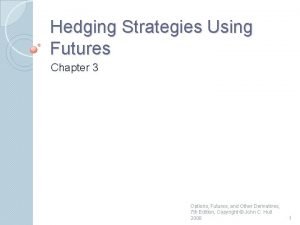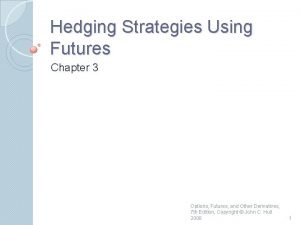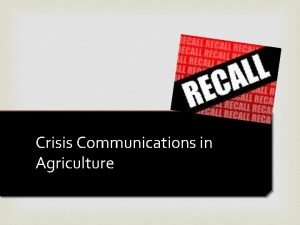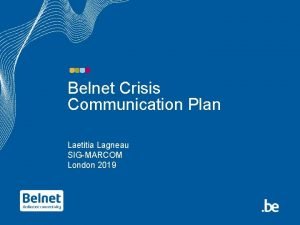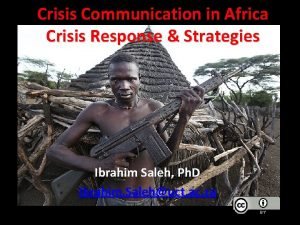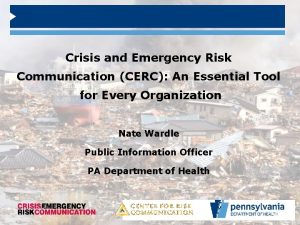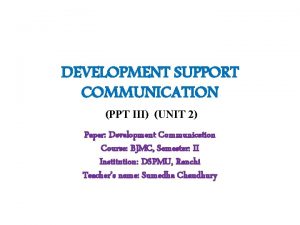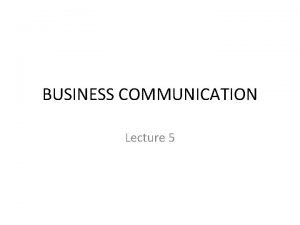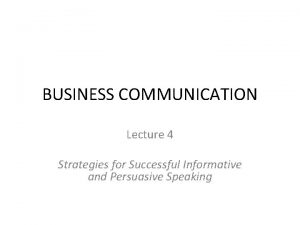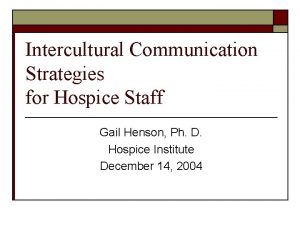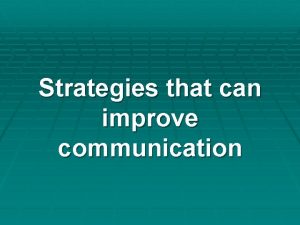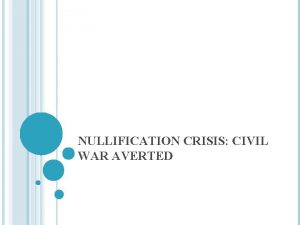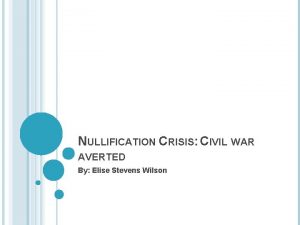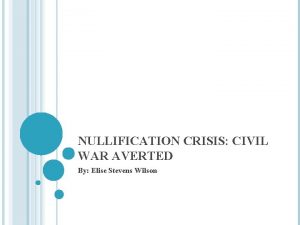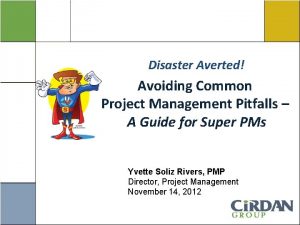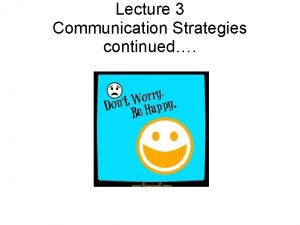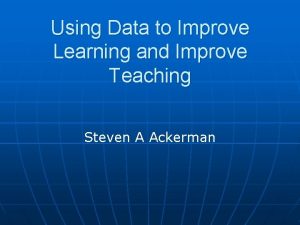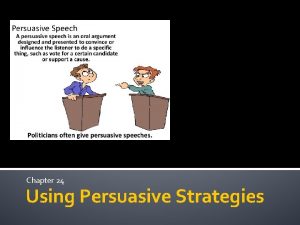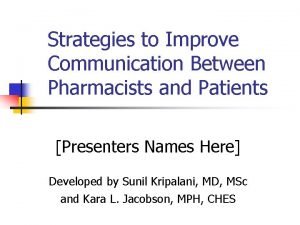Crisis Averted Using Crisis Communication Strategies to Improve

















- Slides: 17

Crisis Averted: Using Crisis Communication Strategies to Improve Academic Advising for Recovery Students By: Devin Mc. Cain Texas Tech University

TTUA Background and Breakdown Competitive – students who know what they want to major in, they just don’t meet the GPA requirements to officially declare their major. Undecided – students who are undecided in their best fit major and would like more time for Discovery! and selfevaluation. Recovery – students whose Academic Standing is Probation, Academic Suspension, or Additional Academic Suspension and are required to meet with TTUA for Academic Recovery.

TTUA Background and Breakdown • TTU Policy: • Probation: cumulative GPA < 2. 0 • Academic Suspension: cumulative GPA < 2. 0 for two consecutive semesters • Additional Academic Suspension: semester GPA < 2. 0 upon return from suspension • ARP Process: • Reapply for admission • Complete the Academic Success Workbook • Complete an initial 1 ½ hour Academic Recovery Plan appointment with a TTUA advisor • Fill out Academic Recovery Agreement/Contract • *Enroll in a Programs for Academic Development and Retention Course (Probation & Suspension) • *Get Dean’s Approval (Additional Academic Suspension only)

A Crisis… “Crisis: the perception of an unpredictable event that threatens important expectancies of stakeholders and can seriously impact an organization’s performance and generate negative outcomes. ” “Disrupts or affects the entire organization or has the potential to do so. ” “Crises are unpredictable NOT unexpected. ” – W. Timothy Coombs

Crisis Breakdown • Three-stage Approach • Pre-Crisis: Signal detection, prevention, crisis preparation. • Crisis: Crisis recognition, crisis containment. • Post-Crisis • Crisis Management • Prevention (mitigation) • Preparation • Response • Recovery • Revision Crisis Management seeks to prevent or lessen the negative outcomes of a crisis and thereby protect the organization, stakeholders, and industry from harm.

Proactive Crisis Communication Issues Management Risk Management Reputation Management Undecided Competitive Recovery • Issue Management: an issue is a trend or condition that, if continued, would have a significant effect on how a company is operated. • Risk Management: represents attempts to reduce the vulnerabilities faced by an organization. Vulnerabilities are weaknesses that could develop into crises. • Reputation Management: a reputation is an evaluation stakeholders make about an organization.

Crisis Prevention Process 1. ID Resources to Scan 2. Diagnose Vulnerabilities 3. Crisis Management Team • Spokesperson 4. Information Gathering 5. Information Processing • Message Overload 6. Crisis Response • Follow-up 7. Crisis Evaluation

ID Resources to Scan • Student Records: • Transcripts • Mid-term Grades (If applicable) • Semester progress • Campus Resources and Organizations: • Military Veterans Programs • First Generation Programs • Tutoring • Mentor Programs • Social Media • Departmental Policies • Campus Events • Alternative Advisors (Athletic, etc. )

Diagnose Vulnerabilities • Academic Success Workbook • SWOT Analysis: Strengths, Weaknesses, Opportunities, and Threats • Outside Influences: Work, Family Obligations, Greek Life, Financial Stress… • ‘X’ Factor • Warning Signs

Crisis Management Team • Departmental/Advisor Training: Initial Training, Advising Academy, Professional Development… • Interoffice Communication: Weekly Meetings, Regular Communication • Other Resources: Learning Counselor/Specialists, Professors, Alternative Advisors, Family Support. • Spokesperson – Assigned Advisor • Relationship Building: Weekly Emails, Appointments, Follow-Ups…

Information Gathering • Data Reports • Initial ARP Appointment – Develop the Relationship • Start positive. • Active Listening. Listen more than you talk. • Create an Action Plan • Should be developed by the student rather than the advisor • Flexible Stability • Set Goals • ID applicable resources • UA Contracts • ARP Follow-up

Information Processing • Most difficult step to assess • Ways TTUA Communicates with Students: • In-person Appointment • Phone Reminder • Phone Appointment • RRO • Other Recruitment Events • Walk-Ins • Email Responses • Birthday Email • Social Media (Facebook, Twitter, & Pinterest) • Blog • Spring and Summer 2014: 55, 510 unique • Website(s) student contacts • Quality Assurance Checks & Registration Checks • Weekly Communication Emails • Program Emails (Discovery! & Pre-Law) • Campus Events • PADR • IS 1100

Crisis Response = ACTION 1. Warning 2. Notification 3. Meeting/Discussion • Implementation of Academic Recovery Plan 4. Follow-Up • Weekly Communication • ARPs

Crisis Evaluation • Student Records • Testimonial • Other ways to evaluate?

Resources • Coombs, W. Timothy. Ongoing Crisis Communication: Planning, Managing, and Responding. 3 rd ed. California, New Delhi, London, and Singaporem Washington D. C. : SAGE Publications, Inc. , 2012. Print. • TTUA Academic Recovery: http: //www. depts. ttu. edu/advising/recover/ • “Giving Life to the Zombies, ” or Helping Students to Reflect on their Stories by Melissa Aday and Maggie Gilchrest-Dunnam

Questions?

Retention Data
 Cholinergic crisis
Cholinergic crisis Hedging strategies using futures
Hedging strategies using futures Tailing hedge
Tailing hedge Imperfect hedge
Imperfect hedge Tailing the hedge
Tailing the hedge Crisis communications working group
Crisis communications working group Crisis communication lecture
Crisis communication lecture Laetitia lagneau
Laetitia lagneau Oil rig explosion
Oil rig explosion Public response
Public response Crisis and emergency risk communication
Crisis and emergency risk communication Role of media in development ppt
Role of media in development ppt 7 strategies of communication
7 strategies of communication Strategies to overcome communication barriers
Strategies to overcome communication barriers Attitude barriers to communication
Attitude barriers to communication Strategies for successful interpersonal communication
Strategies for successful interpersonal communication Informative communication strategies
Informative communication strategies Strategies for improving intercultural communication
Strategies for improving intercultural communication

